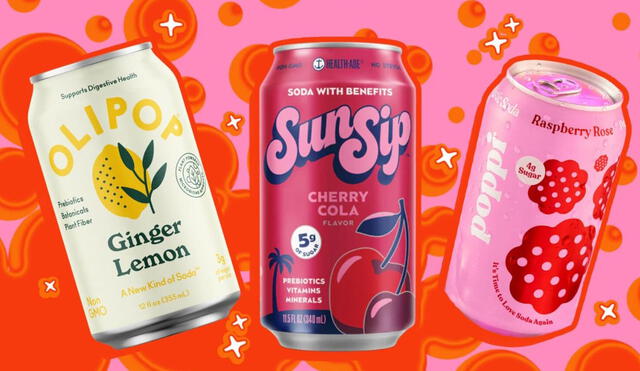Prebiotic sodas: Do they actually benefit your gut health?
Some sodas claim to support gut health due to reduced sugar and added prebiotic fiber. What is the truth?

In recent years, prebiotic sodas have surged in popularity. Major beverage companies like Coca-Cola introducing products such as Simply Pop to cater to health-conscious consumers. These beverages claim to support digestive health by incorporating prebiotic fibers. But do they truly offer the supposed benefits?
First, it is important to mention that regular sodas are some of the most demonized drinks when it comes to overall health. In that sense, many people try to limit their consumption of this sweet beverage. Prebiotic sodas rose as a healthy option for those who wanted to lower their sugar intake as well as cut some calories, all of this without compromising the flavor.
What are prebiotics and why they matter
Gut health is one of the hot topics in the wellness industry for a good reason. When it comes to gut bacteria, prebiotics and probiotics are essential. They are similar but have different roles:
- Probiotics are living microorganisms that feed for your gut microbiome, or the ecosystem of bacteria and other microbes in your intestine. Fermented foods such as yogurt, kimchi, and kombucha are good sources of probiotics.
- Prebiotics are substances that feed probiotics, promoting the growth and health of that “good” bacteria in your gut. Fiber is the most common form of prebiotic, but researchers have found other things can act as prebiotics too, like certain types of fatty acids as well as compounds called polyphenols, which are found in fruits and other plants.
Prebiotics are needed to maintain a decent amount of good bacteria, and fiber is usually the most common addition to these prebiotic sodas. “Not all probiotic sources are able to survive the stomach acid and make it all the way through the stomach and the upper intestine to get down to the lower intestine and repopulate the gut,” says Diane Javelli, RDCD, a clinical dietician at the Nutrition Clinic at UW Medical Center.
Do prebiotic sodas benefit your gut health?
Prebiotic sodas infuse fibers into carbonated drinks, aiming to combine enjoyable flavors with health advantages. As we have covered, the most prevalent prebiotic fiber used in soda is inulin, which is extracted from plants like agave, chicory, and artichoke. Because it’s soluble, it works especially well for fiber formulations added to prebiotic beverages. According to the World Health Organization (WHO), our fiber intake should be one of 25 grams daily.
Some studies suggest that prebiotics can improve calcium absorption, aid in blood sugar regulation, and bolster the immune system. Despite that, the real benefits of prebiotic sodas depend on the type and amount of fiber used. Dietitians emphasize that while these beverages can contribute to daily fiber intake, they should not replace whole foods rich in diverse nutrients and fibers.












